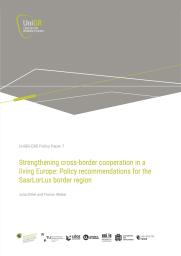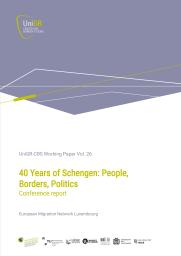Policy Paper Vol. 7

Close cross-border relationships and interdependencies have developed in recent decades in the SaarLorLux border region, and these are crucially linked to the European integration process. However, it is also evident that further deepening of cross-border cooperation requires new impetus and can be hindered by nationalist-populist forces. Based on quantitative and qualitative surveys of municipal decision-makers conducted in 2024 in Saarland (Germany), département Moselle (France), and the Grand Duchy of Luxembourg, this Policy Paper provides an overview of six key areas of action, with corresponding policy recommendations. These areas are: (1) accelerating existing efforts in education and language; (2) reducing bureaucratic hurdles; (3) strengthening municipal competencies; (4) being closer to citizens; (5) adopting pragmatic procedures; and (6) enabling cross-border cooperation in all areas. Europe, and specifically the EU, stands for cooperation that transcends borders, but this requires significant commitment and appropriate opportunities.



